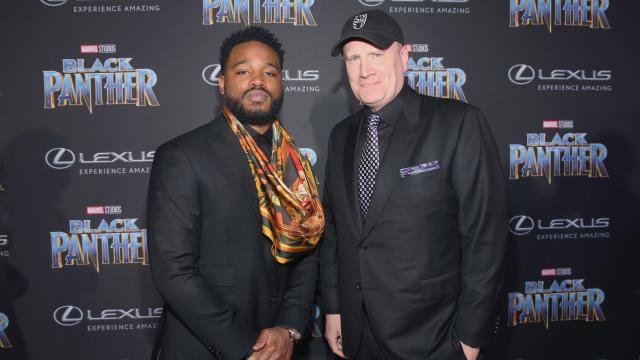If you were to ask basically anyone who’s excited about Black Panther why they think the film is important, you’d undoubtedly hear many an explanation about how it, unlike virtually every other superhero movie, features a cast and story that young, black kids can see themselves in.
Image: Getty
We’ve explained this countless times before, but it’s an idea that’s always worth repeating: On-screen representation is an important part of how we, as a society, send messages about our values and ideas about different kinds of people. A movie such as Black Panther that’s set in Africa with a predominantly black cast tells black audiences in particular that they, too, can be heroic and that their stories belong in the larger cultural canon.
While this is something that fans and enthusiasts can talk about in exhaustive detail, the message is seemingly lost on Hollywood studios – the majority of which are led by white men – that have this curious historical habit of disproportionately producing films that really only centre white people. But Marvel head Kevin Feige wants you to know that he gets why Black Panther is important.
In a recent interview with Vulture, Feige spoke about the experience of seeing children dressed up as Anthony Mackie’s Falcon, and how it hit him just how significant Black Panther would be:
It’s something that’s easy to take for granted, growing up in the United States as a white male, that my cinematic heroes look like me. I never thought they looked exactly like me, because I’m not a big athletic hero, but they do.
It’s something that over the course of these ten years, having a certain amount of power over what type of movies are made and what type of actors we hire, I want everybody to have that feeling. We don’t take it for granted that people want to see themselves reflected in our heroes and our characters. That’s been the case in the comics for years, and, finally, that’s the case in the movies, and will only continue from here.
What Feige’s saying here is in no way revolutionary, but let’s take a moment to appreciate Feige’s very careful choice of words when talking about representation, how he himself has experienced it in the past, and why Black Panther is different.
Oftentimes, people will feign ignorance about what we mean when we’re talking about meaningful representation. Some argue that because not every single kind of white person is universally represented on film, white people have been similarly starved for depictions of themselves on screen. Feige accurately describes how, even though he himself may not look like a Comic Book Movie Chris™, he can, on a some level, see himself in and identify with the heroes in the films Marvel makes and a big part of that is because they’re white. That doesn’t mean that Captain America’s whiteness is the only thing Feige can relate to, but rather that, as a baseline for the character, that connection is already there.
There have been black characters in Marvel’s Cinematic Universe before, but there’s never been a superhero movie so ensconced in blackness, African culture, and ideas about the African diaspora as Black Panther. It’s a film that everyone, but black people in particular, will be able to connect with in a completely different and powerful way. Feige understands that and hopefully you do, too.
[Vulture]
